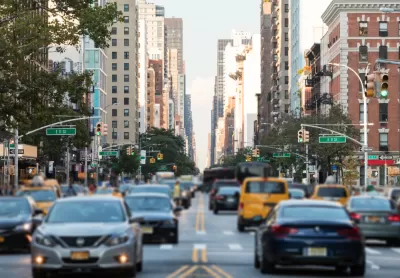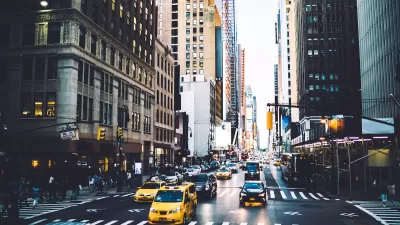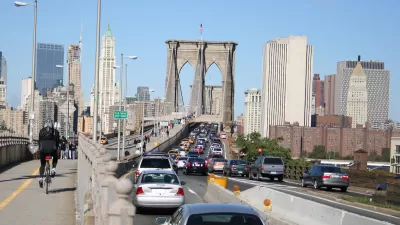Hundreds of people signed up to speak at the city’s first public meeting on the long-delayed plan to charge drivers entering Manhattan’s Central Business District.

New Yorkers got their first opportunity to comment on the city’s proposed congestion pricing plan in the first of six public hearings on the issue. As Catalina Gonella and Phil Corso write in Gothamist, “The plan, which would toll drivers in Manhattan south of 60th Street as much as $23 during rush hour, was designed to lessen traffic congestion by as much as 20%, according to an MTA analysis.”
Close to 400 people signed up to speak at the meeting, which ran late into the night last Thursday. Some expressed concern about the cost to residents in communities that lack subway stations or round-the-clock bus service, such as senior citizens who travel to Manhattan for medical appointments. Others showed support for the plan, hoping it will help improve transit and reduce pollution and traffic deaths.
According to the article, “The affected toll zone, dubbed the ‘Central Business District,’ draws roughly 7.67 million people on the average weekday, according to an MTA study. The capital plan was last pegged at $56 million with about 30% of that being covered by the congestion pricing proposal, the MTA said.”
The program, which was originally scheduled to start collecting revenue in 2021, was delayed repeatedly, including earlier this year when the Federal Highway Administration (FHA) asked the city to answer hundreds of additional questions regarding its environmental impact assessment.
FULL STORY: Commuters sound off at MTA’s first congestion pricing public hearing

Alabama: Trump Terminates Settlements for Black Communities Harmed By Raw Sewage
Trump deemed the landmark civil rights agreement “illegal DEI and environmental justice policy.”

Study: Maui’s Plan to Convert Vacation Rentals to Long-Term Housing Could Cause Nearly $1 Billion Economic Loss
The plan would reduce visitor accommodation by 25% resulting in 1,900 jobs lost.

Planetizen Federal Action Tracker
A weekly monitor of how Trump’s orders and actions are impacting planners and planning in America.

Waymo Gets Permission to Map SF’s Market Street
If allowed to operate on the traffic-restricted street, Waymo’s autonomous taxis would have a leg up over ride-hailing competitors — and counter the city’s efforts to grow bike and pedestrian on the thoroughfare.

Parklet Symposium Highlights the Success of Shared Spaces
Parklets got a boost during the Covid-19 pandemic, when the concept was translated to outdoor dining programs that offered restaurants a lifeline during the shutdown.

Federal Homelessness Agency Places Entire Staff on Leave
The U.S. Interagency Council on Homelessness is the only federal agency dedicated to preventing and ending homelessness.
Urban Design for Planners 1: Software Tools
This six-course series explores essential urban design concepts using open source software and equips planners with the tools they need to participate fully in the urban design process.
Planning for Universal Design
Learn the tools for implementing Universal Design in planning regulations.
Caltrans
Smith Gee Studio
Institute for Housing and Urban Development Studies (IHS)
City of Grandview
Harvard GSD Executive Education
Toledo-Lucas County Plan Commissions
Salt Lake City
NYU Wagner Graduate School of Public Service




























